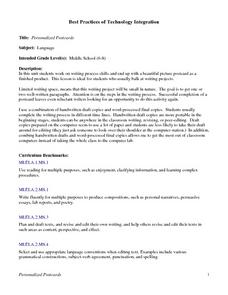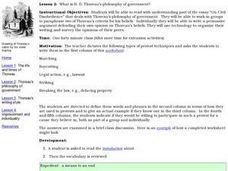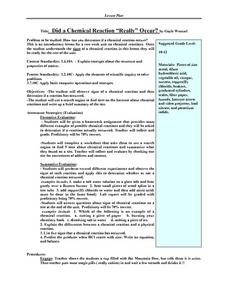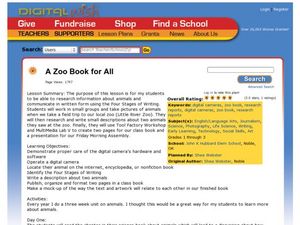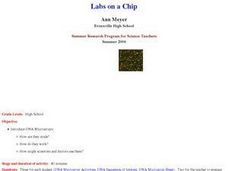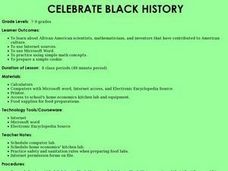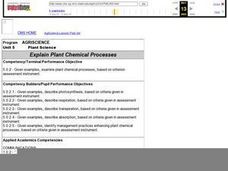Curated OER
Personalized Postcards
Students create and send postcards to friends and family members. Using actual photographs, they write a rough draft and final draft of a paragraph and print it out to glue onto a postcard template to mail to their friend or family member.
Curated OER
H.D. Thoreau's Philosophy of Government
Students read an essay by H.D. Thoreau as analysis of his philosophy on government. In this Thoreau analysis lesson, students work in groups to paraphrase two of Thoreau's criteria for his beliefs about government. Students write a...
Curated OER
Who is Dr. Seuss?
Learn more about Dr. Seuss in an author study activity. After young readers create a KWL chart on information they know about Dr. Seuss, they take on group roles, such as the researcher or recorder, to find out more about Dr. Seuss. They...
Statistics Education Web
How High Can You Jump?
How high can your pupils jump? Learners design an experiment to answer this question. After collecting the data, they create box plots and scatter plots to analyze the data. To finish the lesson plan, they use the data to draw conclusions.
Statistics Education Web
Which Hand Rules?
Reaction rates vary between your dominant and nondominant hand ... or do they? Young scholars conduct an experiment collecting data to answer just that. After collecting data, they calculate the p-value to determine if the difference is...
Curated OER
It's Written in the Stars!
Children create narrative accounts about their character traits, illustrate the constellation of each sign of the Zodiac, and write and illustrate their own creative myths about an original "Zodiac Sign". They use the computer as a...
Curated OER
Did a Chemical Reaction "Really" Occur?
Students perform several different experiments to observe signs of chemical reactions and determine if reaction has occurred, use search engine to find Internet sites pertaining to chemical reactions, and write up brief summary of site.
Curated OER
Wild Weather Word Hunt
In this weather worksheet, young scholars and their families search for weather news in the newspaper, media or Internet. Students record a list of weather words. Young scholars then research and write down a one week forecast for their...
Curated OER
Potato Launcher Energy Lab
Pupils investigate conservation laws using a potato launcher. In this physics lesson plan, students measure angles, time and distance of the potato. They discuss applications of experiments like this.
Curated OER
A Zoo Book for All
A visit to the local zoo launches an integrated life science/ language arts research project into the habitat, feeding habits, offspring, lifespan, and other interesting facts about animals. Each group selects two animals to photograph...
Curated OER
Labs on A Chip
Students are introduced to DNA microarrays. They discuss how scientists and doctors use them and how they work. They complete a worksheet and discuss their findings.
Curated OER
Ocean Floor Properties and Near Shore Environments
Pupils explore and model the characteristics of the ocean floor and near shore environments through in-class demonstrations, laboratory activities, and internet research. They use classroom materials to research the characteristics of...
Curated OER
Enzyme Activity: An Inquiry Based Approach
Using an inquiry approach to studying biochemical reactions, cooperative teams of students investigate hypotheses about living materials that contain enzymes which break down in hydrogen peroxide. They perform experiments, practice...
Curated OER
From the Beginning of Time, Online: Using the Internet to Explore History
Students use the Internet to research historical events. They compare and contrast different websites to find the best information. They write summaries based on the information they found and give presentations.
Curated OER
Nature of Science and Ecology
Learners identify the different biotic and abiotic components of an ecosystem. In this ecology lesson, students perform a case study on current environmental problems. They write a position statement about their chosen topic and share it...
Curated OER
Corrosion/Plating/Electrolysis
Students familiarize themselves with half cell reactions, potential circuits, etc. They participate in a lab that includes a worksheet that guides them through an inquiry pertaining to the content. They complete a series of questions...
Curated OER
Chemical Weathering
Eighth graders comprehend the effects of chemical and mechanical weathering. They comprehend the differences between the two forms of weathering and the various agents involved in both forms of weathering. Students complete a...
Curated OER
Clouds: an Internet Based Lesson Plan
Students watch a teacher demonstration of cloud formation. They research cloud formation on the Internet to write reports that summarize the process of cloud formation.
Curated OER
China CultureQuest
Students use the internet and other tools to examine the culture of China. In groups, they brainstorm a list of topics they want to know more about and practice writing Chinese letters. They create a collage to show the class what...
Curated OER
Flour Beetles
Students observe life stages in flour beetles and graph the results. They write a summary report.
Curated OER
Celebrate Black History
Students research African-American mathematicians. In this middle school mathematics lesson, students celebrate Black History by conducting Internet research on an African-American, mathematicians or scientist. Students prepare a...
Curated OER
ESL News Press
Students assume the roles of editors and news reporters and develop and create a school newspaper. Working in groups they brainstorm article topics for different sections of the paper. They conduct research about current events,...
Curated OER
Explain Plant Chemical Processes
Students discover plant chemical processes through three lab activities. Overheads, data sheets, and teaching procedures provided for the unit covering photosynthesis, respiration, and transpiration.
Curated OER
Handwriting Practice: I Can Run
In this printing sentences worksheet, students trace two examples of the sentence "I can run." Students then practice writing this sentence two times on their own. This is Zaner-Bloser style.


